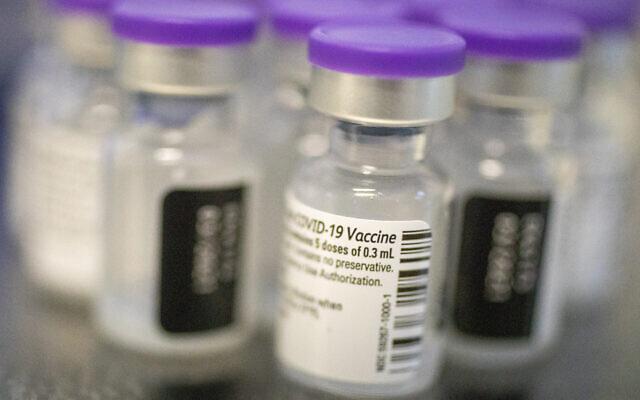The Pfizer-BioNtech and Moderna coronavirus vaccines produce a continuing immune response, a study has found, indicating that they offer long-lasting protection against COVID-19.
The study, published Monday in the peer-reviewed journal Nature, found that the vaccines “induce persistent” production of antibodies “enabling the generation of robust humoral immunity.”
In addition, the vaccines were found to produce high levels of antibodies against three known variants of the coronavirus, including the Beta variant first detected in South Africa. There was an even stronger antibody response to the variants among those who were vaccinated after already previously being infected with COVID-19.
Though researchers only studied those who received the Pfizer-BioNtech vaccine, it uses the same mRNA technology to produce inoculation as the Moderna shots.
Whereas many existing vaccines use bits of virus or bacterial proteins to prompt an immune response, the mRNA-based coronavirus vaccines instruct the body to make and release so-called spike proteins, which then induce the immune response.
“The immune response to such vaccines is both strong and potentially long-lasting,” according to a report Monday from the Washington University School of Medicine, whose scientists led the research.
Though other studies have tracked the levels of antibodies in the blood of vaccinated people over time, the new research took a closer look at how the immune response developed in the body.

Vials of the Pfizer-BioNTech COVID-19 vaccine at Ichilov Hospital in Tel Aviv, December 20, 2020. (AP Photo/Ariel Schalit)
Researchers discovered that germinal centers in the lymph nodes of participants in the study were still very active four months after they received their first vaccine shot.
“Germinal centers are the key to a persistent, protective immune response,” explained senior author Ali Ellebedy, associate professor of pathology and immunology, of medicine and of molecular microbiology. “Germinal centers are where our immune memories are formed. And the longer we have a germinal center, the stronger and more durable our immunity will be because there’s a fierce selection process happening there, and only the best immune cells survive.”
Forty-one people were examined for the study, eight of whom had previously been infected with COVID-19 and all of whom were given the standard two doses of the Pfizer-BioNTech vaccine.
Germinal samples were taken from 14 of the people who received the vaccine, three weeks after their first dose and just before getting their second. Additional samples were taken at weeks 4, 5 and 7. In addition, ten of the participants gave samples 15 weeks after they first started the vaccine doses. None of those who gave germinal samples had previously caught COVID-19.

Screen capture from video of Ali Ellebedy, an immunologist at Washington University in St. Louis. (YouTube)
Researchers found that after three weeks, germinal centers, located in the armpits, were formed in all 14 participants and that at the end of the study period, eight of 10 participants tested still had “detectable germinal centers containing B cells targeting the virus,” according to the WUSM report.
Even 15 weeks after the first vaccine shot was given, the germinal centers were still producing immune cells.
“This is evidence of a really robust immune response,” co-senior author Rachel Presti said. “Your immune system uses germinal centers to perfect the antibodies so they can bind well and last as long as possible. The antibodies in the blood are the end result of the process, but the germinal center is where it is happening.”
The study examined blood samples from all 41 people who received the Pfizer vaccine.
Antibody levels were seen to rise slowly after the first dose in those who had not had prior exposure to the virus, but rose much more rapidly in those who had been infected with COVID-19.
Ellebedy told The New York Times that a vaccine booster shot for those who had never been infected with COVID-19 would probably produce the same effect.
“If you give them another chance to engage, they will have a massive response,” he said, referring to the cells that target the virus.
Israel is using the Pfizer-BioNTech vaccine for its national inoculation drive, which has so far given both shots to over half the population. Though COVID-19 infections dropped from thousands a day to just a few dozen, the country has seen a recent resurgence of cases blamed on a Delta variant first detected in India.
Israel has already placed orders for millions more of the vaccines as it opened up inoculation to children aged 12-15 and in case a decision is made to issue booster shots to the entire population.
Pfizer, Moderna COVID vaccines produce ‘long-lasting’ immune response — study - The Times of Israel
Read More
No comments:
Post a Comment